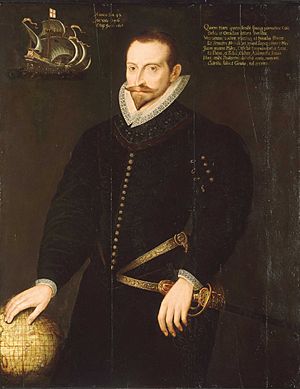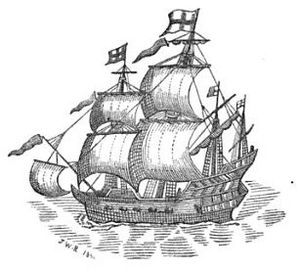James Lancaster facts for kids
Sir James Lancaster (born around 1554 – died 6 June 1618) was an English sailor who was both a privateer and a trader during the time of Queen Elizabeth I. A privateer was like a legal pirate, allowed by the government to attack enemy ships.
Contents
Early Life and First Voyage
James Lancaster was born in Basingstoke, a town in Hampshire, England. When he was younger, he worked as a soldier and a trader in Portugal.
On April 10, 1591, Lancaster began a very important journey to the East Indies. He set sail from Torbay in Devon, England, with three ships: the Penelope, the Marchant Royal, and the Edward Bonaventure. This was one of the first English trips to the Indian Ocean. They reached Table Bay in Africa on August 1, 1591.
Challenges on the Journey
During this long trip, they faced many problems. One ship was lost near Cape Correntes. The remaining ships stopped at Zanzibar in February 1592 to rest and make repairs. They then sailed around Cape Comorin and reached Penang in the Malay Peninsula by June. Lancaster stayed there until September.
After sailing to Ceylon (modern-day Sri Lanka), the sailors wanted to go home. The return journey was very difficult and dangerous. Only 25 men survived to reach England in May 1594. Lancaster himself arrived in Rye on May 24, 1594.
Impact of His Voyages
Lancaster's journey to India was very important. It helped lead to the creation of the British East India Company. This company was formed to trade with countries in Asia.
Later that same year, Lancaster led another expedition. This time, he went to Pernambuco and Recife in Brazil. His goal was to capture valuable goods from a Portuguese ship that had been damaged in a storm. This mission was very successful. He took over the town and loaded the ship's cargo, including Brazil-wood, which was used to make a valuable red dye.
Leading the East India Company Fleet
In 1600, James Lancaster was chosen to lead the East India Company's very first fleet. He sailed from Torbay on April 22, 1601, on his ship called the Red Dragon. He was also sent as a special messenger from Queen Elizabeth to leaders in the East.
Lancaster sailed around the Cape of Good Hope on November 1, 1601. He visited the Nicobars and then went to Aceh and other parts of Sumatra in June 1602. He also visited Bantam in Java. He made an agreement with Aceh, and the first English trading post was set up in Bantam. He also sent a trading team to the Moluccas. On this trip, Lancaster also captured a large Portuguese ship and took its goods.
His return journey from February 20 to September 11, 1603, was quick and successful. Because of his success in trade and diplomacy, the new king, King James I, made him a knight in October 1603.
Later Life and Legacy
Sir James Lancaster remained a key leader of the East India Company until he passed away in June 1618. Many of the early voyages to India and the search for the Northwest Passage were planned and supported by him. In July 1616, the Lancaster Sound, which is an entrance to the Northwest Passage in Baffin Bay, was named after him by explorer William Baffin.
In his will, Sir James Lancaster set up two charities. One was to help officials and poor people in his hometown of Basingstoke. The other provided money for poor students studying to be religious leaders at Oxford and Cambridge universities. These grants are still given out today.
Fighting Scurvy
During his travels, Lancaster noticed that eating fresh fruit helped prevent a terrible disease called scurvy. Scurvy was a common and deadly illness for sailors on long voyages, caused by not getting enough vitamin C.
In 1601, Lancaster did an experiment to see if lemon juice could prevent scurvy. His fleet of four ships left Torbay on April 21, 1601. By August 1, just four months later, scurvy started to appear on three of the ships. By the time they reached Table Bay on September 9, those three ships were so badly affected that men from Lancaster's ship, the Red Dragon, had to help them into the harbor.
Lancaster's men stayed much healthier than the men on the other ships. This was because every morning, he gave them three spoonfuls of bottled lemon juice that he had brought with him. Lancaster spent a lot of time in Madagascar, where he collected more lemon juice and other citrus fruits to treat his crew. He sent a report about his findings to the Admiralty (the British navy's leaders). However, it took almost 200 years, and countless unnecessary deaths, before the Admiralty finally made it a rule in 1795 that all sailors must be given lemon juice.



